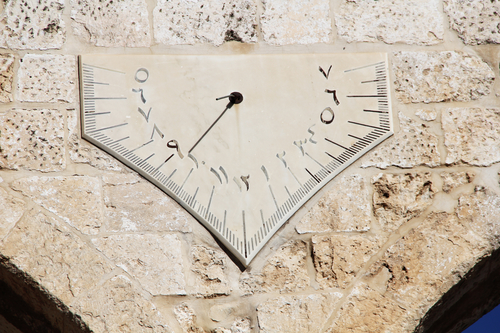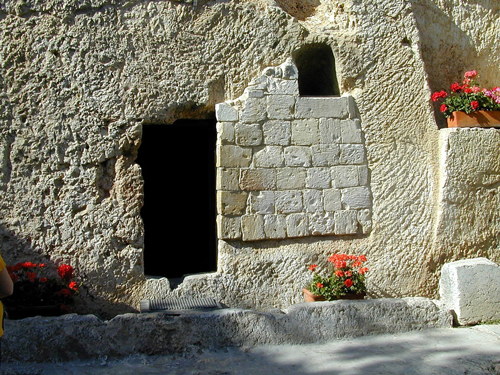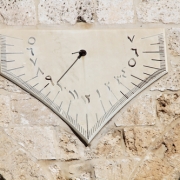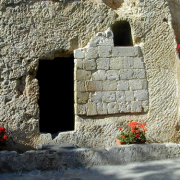Humble and Exalted
/0 Comments/in For Pastors, Preachers, Bible Teachers/by David GuzikDear Pastor, Preacher, or Bible Teacher –
You’re probably familiar with this wonderful event in the life of Jesus – His baptism. This was another example of His radical identification with sinful humanity. It also marked the starting point of His earthly ministry.
Mark 1:9-11 tells the story:
It came to pass in those days that Jesus came from Nazareth of Galilee,
and was baptized by John in the Jordan. And immediately,
coming up from the water, He saw the heavens parting
and the Spirit descending upon Him like a dove.
Then a voice came from heaven, “You are My beloved Son,
in whom I am well pleased.”

What I want to show you is how the baptism of Jesus shows both humility and exaltation.
The baptism of Jesus displayed a humble beginning:
– Jesus: This was a common, unremarkable name.
– From Nazareth: This was an unremarkable, despised village.
– Of Galilee: This was the unspiritual region, not the “Bible belt” of the area at that time.
– Was baptized: Jesus identified with sinful man.
– In the Jordan: This was an unremarkable – often even unpleasant – river. Some rabbis disqualified the Jordan River for purification ceremonies.
At the same time, this scene also displayed great glory:
– The heavens parting: Heaven opened wide for this.
– The Spirit descending: The Spirit of God was present, and in some way His presence was discernable.
– Like a dove: In some way the Spirit was present and “flew down” on Jesus like a dove.
– A voice came from heaven: It’s rare in the Bible when we read that God speaks audibly from heaven, but this was one of those glorious occasions.
– You are My beloved Son, in Whom I am well pleased: What could be more glorious than to hear public affirmation from God the Father?
We each need to put our trust in and receive the ministry of this humble and exalted Savior, Jesus Christ.
As pastors, preachers, and Bible teachers, we also need to understand that our own ministries will have times of humility, times of exaltation, and times where they are a mixture of both. God has a wonderful purpose in both.
Blessings to You in Jesus’ Name – David Guzik
Click Here to Receive Email from David for Pastors, Preachers, and Bible Teachers
The Trap of Success
/0 Comments/in Weekly Devotional/by David GuzikSpecial Note: During this season of the Coronavirus, I’m doing a special daily devotional on YouTube. Click here for today’s video devotional.
At that time Berodach-Baladan the son of Baladan, king of Babylon, sent letters and a present to Hezekiah, for he heard that Hezekiah had been sick. And Hezekiah was attentive to them, and showed them all the house of his treasures— the silver and gold, the spices and precious ointment, and all his armory— all that was found among his treasures. There was nothing in his house or in all his dominion that Hezekiah did not show them. (2 Kings 20:12-13)
God was so good to King Hezekiah that he gave him 15 years more of life. But it was up to Hezekiah if those years would be lived out in wisdom, and to the glory of God. This was a challenge that Hezekiah did not meet very well.

After his recovery, the king of Babylon sent letters and a present to Hezekiah, for he heard that he had been sick and had recovered. Apparently, this was a gesture of kindness from the king of Babylon, showing concern to Hezekiah as fellow royalty.
Hezekiah was pleased with these gifts. We can imagine that this was flattering for King Hezekiah. After all, Judah was a lowly nation with little power, and Babylon was a junior superpower. To receive attention and recognition from the king of Babylon must have really made Hezekiah feel he was important.
So, Hezekiah showed them the house of his treasures. Hezekiah probably wanted to please these envoys from Babylon and wanted to show them that they should be impressed. So, he did everything he could to impress them, and showed them the very best riches of the royal household – and he showed them everything (There was nothing in his house or in all his dominion that Hezekiah did not show them).
As the coming rebuke from Isaiah will demonstrate, this was nothing but proud foolishness on Hezekiah’s part. He was in the dangerous place of wanting to please and impress men, especially ungodly men.
Hezekiah faced – and failed under – a temptation common to many, especially those in ministry: the temptation of success. Many men who stand strong against the temptations of failure and weakness fail under the temptations of success and strength.
We might say success led Hezekiah to sin in at least five ways:
– Pride, in that he was proud of the honors the Babylonians brought.
– Ingratitude, in that he took honor to himself that really belonged to God.
– Abusing the gifts given to him, where he took the gifts and favors to his own honor and gratification of his lusts (2 Chronicles 32:25-26).
– Carnal confidence, in that he trusted in the coalition he had made with the king of Babylon.
– Missing opportunity, in that he had a great opportunity to testify to the Babylonian envoys about the greatness of God and the LORD’s blessing on Judah. Instead, he glorified himself.
As God gives you success, be grateful – but also be careful. Watch out for the trap of success.
El reloj de sol en sentido contrario
/0 Comments/in Devocional Semanal/by David GuzikY Ezequías había dicho a Isaías: ¿Qué señal tendré de que Jehová me sanará, y que subiré a la casa de Jehová al tercer día? Respondió Isaías: Esta señal tendrás de Jehová, de que hará Jehová esto que ha dicho: ¿Avanzará la sombra diez grados, o retrocederá diez grados? Y Ezequías respondió: Fácil cosa es que la sombra decline diez grados; pero no que la sombra vuelva atrás diez grados. Entonces el profeta Isaías clamó a Jehová; e hizo volver la sombra por los grados que había descendido en el reloj de Acaz, diez grados atrás. (2 Reyes 20:8-11)
2 Reyes 20 comienza con Ezequías, rey de Judá, enfermo de una enfermedad grave. Entonces el profeta Isaías le trajo un anuncio sorprendente: Dios le dijo al rey Ezequías que pronto moriría, y que necesitaba poner su casa en orden. Ezequías oró, rogándole a Dios que le perdonara la vida.

Dios le respondió a Ezequías y le dijo que tendría quince años más de vida. Sin embargo, por alguna razón, el rey quería más que una palabra del profeta. Pidió una señal milagrosa: ¿Qué señal tendré de que Jehová me sanará?
Dios mostró aún más misericordia a Ezequías. Dios no estaba obligado a dar esta señal. De hecho, Dios habría sido justificado al decir: “Lo dije y tú lo crees. ¿Cómo te atreves a no tomar Mi palabra como verdadera?” Pero con amor verdadero, Dios le dio a Ezequías más de lo que necesitaba o merecía.
A nosotros, Dios nos muestra la misma misericordia. Debería ser suficiente que Dios simplemente nos diga: “Te amo”. Pero Dios hizo mucho para demostrarnos su amor (Juan 3:16, Romanos 5: 8).
Curiosamente, Dios prometió hacer algo completamente milagroso para la señal para confirmar. Prometió hacer que la sombra del reloj de sol se moviera hacia atrás en lugar de hacia adelante. Este signo era perfecto para Ezequías.
Al hacer que la sombra del reloj de sol se moviera hacia atrás, daba más tiempo en un día, tal como Dios le dio más tiempo a Ezequías. No sabemos cómo hizo Dios este milagro, pero lo hizo. Al igual que un relojero puede hacer retroceder las manecillas de un reloj que hace, así Dios devolvió el tiempo, o la apariencia del tiempo, para Ezequías. Tenía 15 años más.
No importa cómo sucedió el milagro, 2 Crónicas 32:25 nos dice que Ezequías no respondió correctamente a este bien de curación: Mas Ezequías no correspondió al bien que le había sido hecho, sino que se enalteció su corazón, y vino la ira contra él, y contra Judá y Jerusalén.
¿Te ha dado Dios más tiempo? No te sientas orgulloso; Sé humilde y honra a Dios. ¡Dios nos ha mostrado tanto favor en Jesucristo! Que siempre respondamos a los regalos de Dios con humildad, y nunca con un corazón enorgullecido.
Eine Sonnenuhr, die rückwärts geht
/0 Comments/in Wöchentliche Andacht/by David GuzikHiskia aber sprach zu Jesaja: Welches ist das Zeichen, daß mich der Herr gesund machen wird und daß ich am dritten Tag in das Haus des Herrn hinaufgehen werde? Jesaja sprach: Dies sei dir das Zeichen von dem Herrn, daß der Herr das Wort erfüllen wird, das er gesprochen hat: Soll der Schatten [der Sonnenuhr] zehn Stufen vorwärts gehen oder zehn Stufen zurückkehren? Hiskia sprach: Es ist ein Leichtes, daß der Schatten zehn Stufen abwärts geht; nein, sondern der Schatten soll zehn Stufen zurückgehen! Da rief der Prophet Jesaja den Herrn an; und er ließ an der Sonnenuhr des Ahas den Schatten, der abwärts gegangen war, zehn Stufen zurückgehen. (2. Könige 20,8-11)
In 2. Könige 20 war König Hiskia, der König von Juda, sehr krank. Der Prophet Jesaja überbrachte ihm die erschreckenden Botschaft: Gott sagte König Hiskia, dass er sehr bald sterben würde, und dass er sein Haus in Ordnung bringen sollte. Hiskia betete und flehte Gott an, ihn am Leben zu lassen.

Gott antwortete auf Hiskias Gebet und sagte ihm, dass er noch weitere 15 Jahre haben werde. Doch aus irgendeinem Grund wollte der König mehr als nur das Wort des Propheten. Er bat um eine Wunderzeichen und fragte: welches ist das Zeichen, dass mich der Herr gesund machen wird?
Gott erwies Hiskia noch mehr Barmherzigkeit. Er war nicht dazu verpflichtet, ihm dieses Zeichen zu gewähren. Eigentlich hätte Er auch sagen können: „Ich habe es gesagt, also glaube es. Wie kannst du es wagen, meine Worte nicht als wahr anzunehmen?“ Doch in Seiner Liebe gab Gott Hiskia mehr, als dieser brauchte oder verdiente.
Gott ist auch uns gegenüber so barmherzig. Es sollte eigentlich ausreichen, wenn Gott zu uns sagt: „Ich liebe dich.“ Doch Gott tat so viel, um uns Seine Liebe zu zeigen (Johannes 3,16; Römer 5,8).
Seltsamerweise versprach Gott, als Zeichen etwas total Übernatürliches zu tun. Er wollte den Schatten der Sonnenuhr zurückgehen lassen. Dieses Zeichen passte perfekt auf Hiskia.
Indem der Schatten der Sonnenuhr zurückging, hatte der Tag mehr Zeit – so wie Gott dem Hiskia mehr Zeit gab. Wir wissen nicht, wie Gott dieses Wunder tat, aber Er tat es. So wie ein Uhrmacher die Zeiger seiner Uhr, die er gebaut hat, zurückstellen kann, so stellte Gott die Zeit für Hiskia zurück. Er hatte weitere 15 Jahre.
Egal wie dieses Wunder passierte – in 2. Chronik 32,25 lesen wir, dass Hiskia nicht richtig auf das Geschenk seiner Heilung reagierte: Aber Hiskia vergalt die Wohltat nicht, die ihm widerfahren war, sondern sein Herz überhob sich. Da kam der Zorn über ihn und über Juda und Jerusalem.
Hat Gott dir mehr Zeit gegeben? Sei nicht stolz; sei demütig und ehre Gott. Gott hat uns so viel Gnade in Jesus Christus gegeben! Wir sollten immer in Demut auf Gottes Gaben antworten und niemals mit einem überheblichen und stolzen Herz.
Primicias de la resurrección
/0 Comments/in Devocional Semanal/by David GuzikMas ahora Cristo ha resucitado de los muertos; primicias de los que durmieron es hecho. Porque por cuanto la muerte entró por un hombre, también por un hombre la resurrección de los muertos. Porque así como en Adán todos mueren, también en Cristo todos serán vivificados. Pero cada uno en su debido orden: Cristo, las primicias; luego los que son de Cristo, en su venida. (1 Corintios 15:20-23)
En 1 Corintios 15, Pablo explicó la verdad de la resurrección, comenzando con Jesús. Luego explicó cómo la resurrección de Jesús se conecta directamente con nosotros: que Jesús se ha convertido en las primicias de los que durmieron.

Primicias traduce la antigua palabra griega aparche. En relación con el Antiguo Testamento, esta palabra se usó para la ofrenda de sacrificio de las primicias. En la vida diaria también se usaba para una tarifa de entrada.
Jesús fue primicias de nuestra resurrección en ambos sentidos. En el Antiguo Testamento, la ofrenda de primicias trajo un manojo de grano para representar y anticipar la cosecha completa (Levítico 23: 9-14). La resurrección de Jesús representa nuestra resurrección, porque si fuimos plantados juntamente con él en la semejanza de su muerte, así también lo seremos en la de su resurrección (Romanos 6: 5). La resurrección de Jesús anticipa nuestra resurrección, porque seremos resucitados con un cuerpo como el suyo.
La resurrección de Jesús también es primicias de nuestra resurrección en el sentido de que Él es nuestra “tarifa de entrada” a la resurrección. ¡Jesús pagó nuestra admisión a la resurrección!
Pablo continuó: “Porque por cuanto la muerte entró por un hombre, también por un hombre la resurrección de los muertos”. La idea es que Adán (por un hombre) es una “cabeza” de la raza humana, y toda la humanidad fue llevada a la muerte por Adán. El segundo Adán, Jesucristo (por un hombre) es la otra cabeza de la raza humana, y Jesús trae la resurrección a todos los que están “bajo” su liderazgo.
Todo sucede, “cada uno en su debido orden”. Sería extraño e inapropiado para nosotros recibir la resurrección antes que Jesús. Entonces, Él recibe la resurrección primero como las primicias, y luego nosotros la recibimos “luego. . . en su venida”.
Jesús es primicias de nuestra resurrección; Sin embargo, no fue el primero de resucitar de entre los muertos. Leemos acerca del hijo de la viuda en los días de Elías (1 Reyes 17: 17-24) y Lázaro (Juan 11: 38-44) y Eutico (Hechos 20: 7-12), entre otros. Cada uno de estos fue resucitado de la muerte, pero no como Jesús resucitó. Cada uno de ellos fue resucitado en el mismo cuerpo en el que murieron y eventualmente murieron de nuevo.
La resurrección no es solo vivir de nuevo; es vivir de nuevo en un nuevo cuerpo. El nuevo cuerpo se basa en nuestro antiguo cuerpo, pero es perfectamente adecuado para la vida en la eternidad. Jesús no fue el primero que regresó de entre los muertos, pero fue el primero en resucitar.
Cuando confiamos en Jesús, su resurrección se convierte en la promesa de la nuestra.
Haz clic aquí para el comentario de David sobre 1 Corintios 15
Der Erstling der Auferstehung
/0 Comments/in Wöchentliche Andacht/by David GuzikSpecial Note: During this season of the Coronavirus, I’m doing a special daily devotional on YouTube.
Click here for today’s video devotional.
Nun aber ist Christus aus den Toten auferweckt; er ist der Erstling der Entschlafenen geworden. Denn weil der Tod durch einen Menschen kam, so kommt auch die Auferstehung der Toten durch einen Menschen; denn gleichwie in Adam alle sterben, so werden auch in Christus alle lebendig gemacht werden. Ein jeder aber in seiner Ordnung: Als Erstling Christus; danach die, welche Christus angehören, bei seiner Wiederkunft. (1. Korinther 15,20-23)
In 1. Korinther 15 erklärt Paulus die Wahrheit der Auferstehung, die mit Jesus begann. Er erklärt, wie die Auferstehung Jesu direkt mit uns verbunden ist – dass Jesus der Erstling der Entschlafenen geworden ist.

Erstling ist die Übersetzung des Griechischen Worts aparche. In Verbindung mit dem Alten Testament meinte das Wort das Opfern der ersten Früchte. Im alltäglichen Leben meinte es „Einrittspreis“.
Jesus war auf beide Arten der Erstling für unsere Auferstehung. Im Alten Testament bestanden die Erstlinge aus einem Bündel Getreide, das für die gesamte Ernte stand (3. Mose 23,9-14). Die Auferstehung Jesu steht für unsere Auferstehung, denn wenn wir mit ihm eins gemacht und ihm gleich geworden sind in seinem Tod, so werden wir ihm auch in der Auferstehung gleich sein (Römer 6,5). Die Auferstehung von Jesus ging unserer Auferstehung voraus, denn auch wir werden mit einem Körper wie dem Seinen wieder auferstehen.
Die Auferstehung Jesu ist auch in dem Sinn der Erstling unserer Auferstehung, dass Er der „Eintrittspreis“ für unsere Auferstehung ist. Jesus zahlte für unseren Zutritt zur Auferstehung.
Paulus fährt fort: Denn weil der Tod durch einen Menschen kam, so kommt auch die Auferstehung der Toten durch einen Menschen. Der Gedanke dahinter ist, dass Adam (durch einen Menschen) der „Kopf“ der menschlichen Rasse und durch ihn die gesamte Menschheit dem Tod geweiht war. Der zweite Adam, Jesus Christus (durch einen Menschen) ist der andere Kopf der menschlichen Rasse, und Jesus bringt die Auferstehung zu allen, die „unter“ Seiner Führung sind.
Das alles passiert ein jeder in seiner Ordnung. Es wäre seltsam und unangemessen, wenn wir die Auferstehung vor Jesus erleben würden. Also erlebte Er die Auferstehung als Erstling zuerst, und dann wir danach . . . bei seiner Wiederkunft.
Jesus ist der Erstling für unsere Auferstehung; doch Er war nicht der Erste, der von den Toten auferweckt wurde. Da waren u.a. der Sohn der Witwe zur Zeit Elijas (1. Könige 17,17-24) und Lazarus (Johannes 11,38-44) und Eutychus (Apostelgeschichte 20,7-12). Jeder von denen wurde wiederbelebt, doch niemand wurde wieder auferweckt. Jeder von ihnen lebte in dem Körper weiter, den er vorher hatte und starb letzlich in diesem wieder.
Auferstehung ist nicht nur, dass man wieder lebt; es ist ein neues Leben in einem neuen Körper. Der neue Körper basiert auf unserem alten Körper, aber er ist für die Ewigkeit gemacht. Jesus war nicht der Erste, der von den Toten zurückkam, doch Er war der Erste, der wieder auferstand.
Wenn wir auf Jesus vertrauen, ist Seine Auferstehung die Verheißung für unsere Auferstehung.
The Wrong-Way Sundial
/4 Comments/in Weekly Devotional/by David GuzikSpecial Note: During this season of the Coronavirus, I’m doing a special daily devotional on YouTube. Click here for today’s video devotional.
And Hezekiah said to Isaiah, “What is the sign that the LORD will heal me, and that I shall go up to the house of the LORD the third day?” Then Isaiah said, “This is the sign to you from the LORD, that the LORD will do the thing which He has spoken: shall the shadow go forward ten degrees or go backward ten degrees?” And Hezekiah answered, “It is an easy thing for the shadow to go down ten degrees; no, but let the shadow go backward ten degrees.” So Isaiah the prophet cried out to the LORD, and He brought the shadow ten degrees backward, by which it had gone down on the sundial of Ahaz. (2 Kings 20:8-11)
2 Kings 20 begins with Hezekiah, king of Judah, as sick with a serious illness. Then Isaiah the prophet brought him a startling announcement: God told King Hezekiah that he would soon die, and he needed to set his house in order. Hezekiah prayed, begging God to spare his life.

God answered Hezekiah’s prayer, and told him he would have fifteen more years to live. Yet for some reason, the king wanted more than a word from the prophet. He asked for a miraculous sign, and he asked, what is the sign that the LORD will heal me?
God showed even more mercy to Hezekiah. God was under no obligation to give this sign. In fact, God would have been justified in saying, “I said it and you believe it. How dare you not take My word as true?” But in real love, God gave Hezekiah more than he needed or deserved.
God shows the same mercy to us. It should be enough for God to simply say to us, “I love you.” But God did so much to demonstrate His love to us (John 3:16, Romans 5:8).
Curiously, God promised to do something completely miraculous for the confirming sign. He promised to make the shadow on the sundial move backward instead of forward. This sign fit perfectly for Hezekiah.
By having the shadow of the sundial move backward, it gave more time in a day – just as God gave Hezekiah more time. We don’t know how God did this miracle, but He did. Just like a clockmaker can turn back the hands of a clock he makes, so God turned back time – or the appearance of time – for Hezekiah. He had 15 more years.
No matter how the miracle happened, 2 Chronicles 32:25 tells us that Hezekiah did not respond rightly to this gift of healing: But Hezekiah did not repay according to the favor shown him, for his heart was lifted up; therefore wrath was looming over him and over Judah and Jerusalem.
Has God given you more time? Don’t be proud; be humble and honor God. God has shown us so much favor in Jesus Christ! May we always respond to God’s gifts with humility, and never with a heart lifted up in pride.





